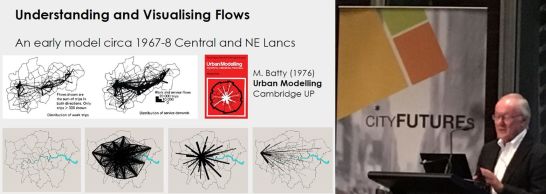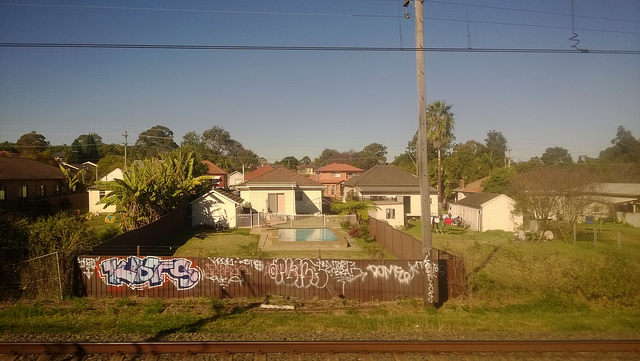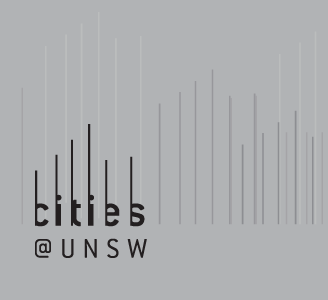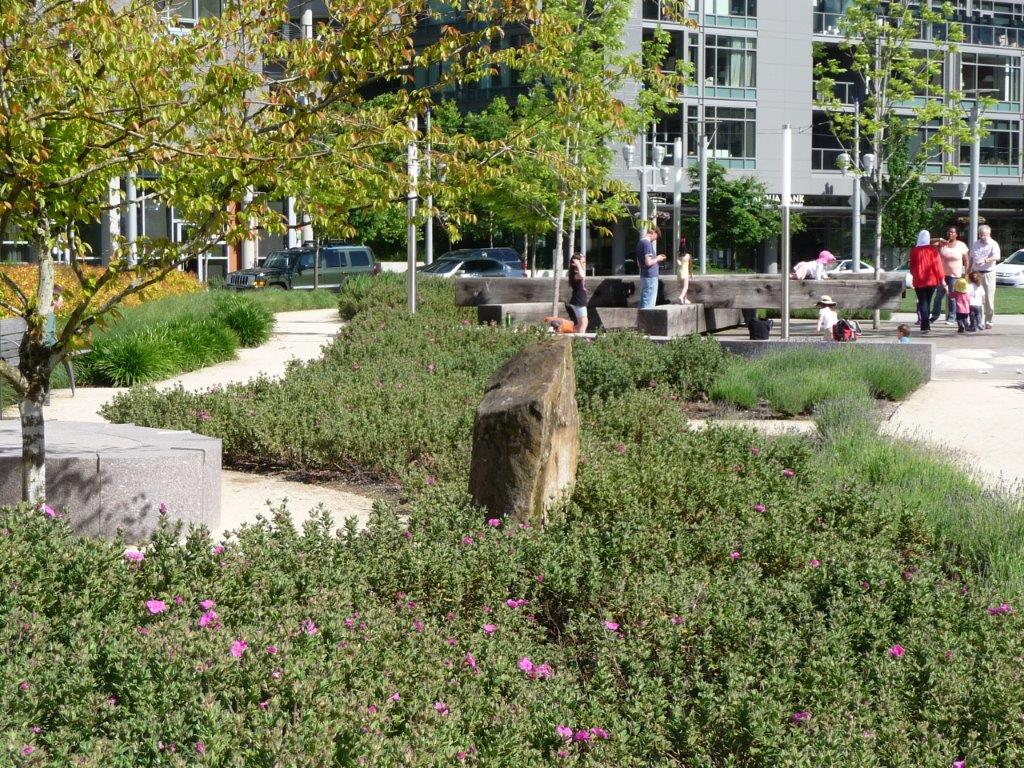As November draws to a close, it seems fitting to reflect briefly on a particularly busy and important month for the City Futures team. This month saw CFRC celebrate its 10th anniversary, a real testament to the hard work and persistence of a great many people over the past decade. [Read more →]
City Futures Research Centre: 10 years young and going strong
Posted by Laura Crommelin on November 30th, 2015 · Cities, Strata
When developers come knocking: why strata law shake-up won’t deliver cheaper housing
Posted by Laurence Troy on November 27th, 2015 · Cities, Housing, Housing supply, Strata, Uncategorized

Recent changes to strata title legislation in NSW will remove the need for all owners to agree to sell or redevelop their apartment block as a whole.
This means that some owners may now have their apartments sold against their will. Only 75% of owners in a building have to agree to the sale for a block to be redeveloped.
The NSW government hopes that this change will increase the number of homes in popular parts of the city and allow older, run-down properties to be rebuilt. Other Australian states and territories are either considering implementing a similar strategy, or already have.
However, new research released today shows that while this may increase the rate of redevelopment of older blocks, on their own these changes may not improve housing affordability or availability.
Change on the way
In a report launched today, we anticipate that this change will:
- Create more uncertainty for apartment dwellers, as it makes apartment ownership less secure than house ownership, and therefore makes these residents more susceptible to market pressures.
- Depending on the location, increase either gentrification or densification. Low-rise blocks in expensive areas (around Sydney harbour, North Shore and Eastern Suburbs) are likely to be replaced with boutique higher value blocks, but not necessarily at higher density (gentrification). Low-rise blocks in lower value suburbs will be replaced by high-rise blocks where planning regulations allow this (densification). Whether this densification will improve affordability is less certain. The map above shows this process.
- Create no significant improvement to affordability of rental and home ownership in Sydney. Old apartment buildings that might be knocked down and rebuilt often provide more affordable housing options. However, our research shows that very few blocks could be developed profitably by private developers into housing that’s affordable to people already living in the local area. While the increase in housing supply may be welcomed, the scale of the increase in housing supply is also unlikely to result in increased affordability.
Qualified support
For this project, we analysed data from the 2011 census, the NSW Strata Title database and the NSW Valuer General’s database. We interviewed 34 key stakeholders including specialist legal and financial professionals, strata management industry professionals, local planners and spokespeople for owner and tenant representative bodies. We also surveyed 1,261 strata residents and owners in properties registered prior to 1990 about their attitudes towards the redevelopment of residential strata schemes. We held workshops with strata owners in the Sydney suburbs of Cabramatta, Coogee, Mosman and Parramatta.
Our research showed that many people acknowledged the importance of these planning goals and supported the need for some type of change to allow for the easier redevelopment of strata properties.
However, many people qualified their support by saying it depended on the outcome for any given block redevelopment. Most people didn’t want to see a single owner holding out on a development purely for personal financial gain, but they also didn’t want to see a vulnerable resident removed from their home against their wishes.
People also saw the benefit of making the renewal of apartment buildings easier if this meant better buildings, better local services and amenity and increased housing affordability.
However, many people were sceptical that new buildings would be of a better quality than existing blocks, and that services and local amenity, including open space, would be provided to cater for increases in population.
Similar changes are planned in Western Australia, Queensland and overseas. The Northern Territory and Singapore and New Zealand have already made similar changes too.
Planners will need to tackle head on the challenges outlined in our research if they are to deliver a compact city that works for all residents – not just the wealthy ones.
Big Data and Smart Cities
Posted by Simone Zarpelon Leao on November 18th, 2015 · Cities
I am a new Research Fellow at the City Futures Research Centre (CFRC) in UNSW, and cannot think of a better time to start, as it is the Centre’s 10 year celebration. The week of activities with academic, government, industry and community partners at the Royal Mint in Sydney CBD was a time for looking back at CFRC‘s achievements so far, and for thinking ahead towards new challenges cities will face.
As part of this celebration Prof Michael Batty, from University College London (UCL)/Centre of Advanced Spatial Analysis (CASA), visited CFRC. On Thursday 12 November he presented a public lecture on ‘Big data, little data, real time streaming and the smart city’. The session was chaired by Prof Chris Pettit who announced UNSW’s plans for a Master of City Science to be available in 2017. [Read more →]
The inequality in our suburbs
Posted by Chris Martin on November 13th, 2015 · Cities, Government
By Bill Randolph, Director, City Futures Research Centre. Originally published in the Sydney Morning Herald.
Gough Whitlam once wrote that “a citizen’s real standard of living, his children’s opportunities for education and self-improvement …are determined not by his income, not by the hours he works, but by where he lives.” In the 40 years that have passed since Gough Whitlam penned those words, far from improving, geographic inequality in Australia is getting worse. Nowhere is this more evident than in the suburbs of our major cities. [Read more →]
Crtl+H the tax reform debate: find ‘GST’; replace with ‘land tax’
Posted by Chris Martin on November 10th, 2015 · Affordability, Government, Housing
Here’s a tip for Federal and State politicians, and the people who advise them.
Take the current debate on tax reform.
Hit Ctrl+H.
Find ‘GST’, replace with ‘land tax’.
Hit return.
Now you’ve got a positive agenda for tax reform. [Read more →]
Cities@UNSW
Posted by Chris Martin on November 9th, 2015 · Cities
City Futures Research Centre is celebrating its 10th anniversary by hosting Cities@UNSW – a week of events about cities, housing, planning and urban science. [Read more →]
It’s not all SINKS, DINKS and nuclear families
Posted by Edgar Liu on November 3rd, 2015 · Cities, Housing supply, Wellbeing
By Edgar Liu & Hazel Easthope
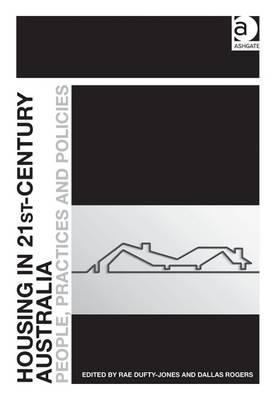
Reading the news headlines in Australia in the last handful of years, one could be forgiven for thinking that the only housing issue the general public is interested in is its price, particularly if and how first-time buyers can afford to enter the housing market, or when the housing ‘bubble’ will burst. A new book, Housing in 21st-Century Australia, edited by Rae Dufty-Jones and Dallas Rogers and with contributions from prominent housing researchers from around Australia, presents a very different picture. [Read more →]
Metro governance and planning
Posted by Chris Martin on October 28th, 2015 · Cities, Government, Planning reform
By Bill Randolph, Director, City Futures Research Centre. This a revised version of an address given at the Cities Roundtable with the Minister for Cities and the Built Environment, Melbourne School of Design.
The way in which our cities are governed is probably the most critical issue in determining how well we collectively respond to the growing challenges our cities face. It’s the one lens through which all our responses to these challenges focus. Improving the governance of our cities should enable better policy and planning outcomes. [Read more →]
Don’t fear boarding houses: they’re probably not what you think
Posted by Edgar Liu on October 26th, 2015 · Housing, Housing supply
By Edgar Liu and Ryan van den Nouwelant. Originally published at The Conversation.
A recent application for an eight-room boarding house in the leafy north Sydney suburb of Cromer attracted over 800 objections from residents and the school community.
Proponents of the project, including governments, may be tempted to dismiss these residents as NIMBYs – members of the not-in-my-backyard brigade.
Our research, however, found that ignoring residents’ concerns and failing to allay their fears helps nobody – least of all those in dire need of affordable housing options. [Read more →]
URMO: principles for public space-making to support human health
Posted by Chris Martin on October 19th, 2015 · Planning reform, Public space, Wellbeing
By Susan Thompson, Professor of Planning and Associate Director (City Wellbeing), City Futures Research Centre, UNSW, and Peter McCue, Executive Officer, NSW Premier’s Council for Active Living (PCAL). A version of this post was published in New Planner, the journal of the Planning Institute of Australia (NSW Division).
Planners have a key role in creating meaningful and health supportive public spaces in the denser city. There is a lot of concern about the densification of our cities, particularly in relation to the loss of private open space and play areas for children that are easy to access. As a result, public spaces are increasingly important for everyday activities, as well as special occasions. It is here that we can relax and contemplate, enjoy a bike ride, power walk or leisurely stroll, play with our children, have a picnic with friends, or celebrate a family birthday. [Read more →]


